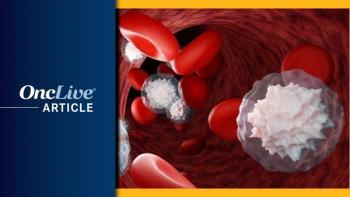
Utility of MRD Testing in CLL Management
William Wierda, MD, PhD: Before we move on to relapsed disease and management for relapsed disease, I want to touch on MRD [minimal residual disease] briefly because it’s been mentioned many times. I agree with you, Dr Allan. We are very focused on MRD in our clinical trial and our clinical trial design—MRD as an end point, MRD as a surrogate marker for depth of response, and prolonged progression-free survival [PFS] for patients with MRD negativity.
Dr Burke, what is the utility of MRD testing in the standard management of patients with CLL [chronic lymphocytic leukemia] in the community? Is MRD useful, or do we stick with fixed-duration and stopping treatment at fixed duration? For example, with venetoclax-based therapy at 1 year for frontline and 2 years in the relapsed setting.
John Burke, MD: I’m somewhere in between. Bill, you and other experts who have been doing this for years have probably been doing MRD on your clinical trials for a long time. Right now, the average community practitioner is not doing MRD at all. I am in a phase where I have increased my use of MRD, even off study. That could be debated whether one should even do that. For me, MRD is a prognostic tool when a patient finishes venetoclax therapy.
MRD helps the patient and the physician understand the patient’s likelihood of relapsing within the next few years. As has been discussed, you have patients with MRD negativity who have a relatively favorable PFS and a low likelihood of relapsing, whereas patients with MRD positivity are much more likely to relapse quicker. MRD is a prognostic tool, but it doesn’t tell you what to do with the information. If a patient is MRD positive, should the patient continue the current course of therapy?
Should the patient go ahead and stop therapy at 1 or 2 years or whatever the defined plan was? Should the patient switch therapy or add a therapy? These are all options, and we don’t know the answer to that question. A trial like CAPTIVATE is going to start getting an answer to that, but these are unknowns. You’ll hear opinions, but you won’t really hear data-driven answers as to what is best for that patient. Likewise, I don’t think we know the best duration of therapy for patients who are MRD negative.
Right now, we have this defined period and we can reassure patients that they’re likely to do relatively well when they stop therapy if they are MRD negative. But would they be better off continuing therapy for a longer period of time with venetoclax, as you do with a BTK [Bruton tyrosine kinase] inhibitor? I don’t think we know the answer to that question. These are a lot of unknowns that we are facing in the field. Should a community practice center check MRD at the end of a venetoclax regimen—1 year, 2 years? I offer that as an option to my patients if they want to know the prognostic information.
If they want to know their likelihood of recurrence within the next couple of years, then we can do that test. If they’re not that interested and they’re worried about cost, MRD is certainly optional and can be omitted for routine clinical practice. There’s my perspective.
Transcript Edited for Clarity


































